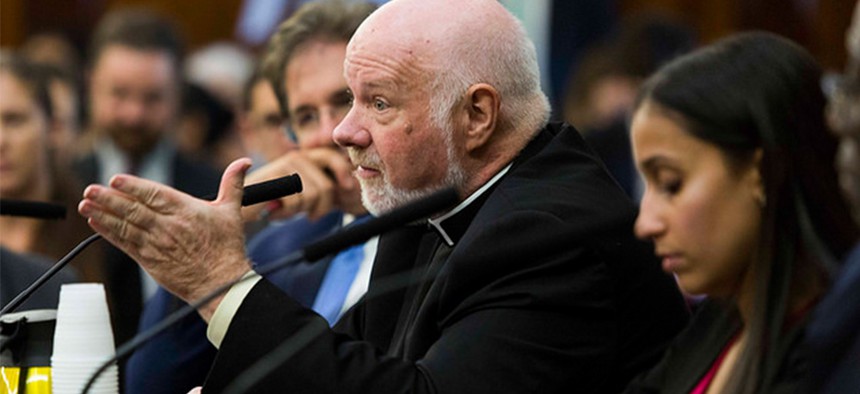Nonprofits update New York City Council on migrant child separations
New York City nonprofits have no idea what the Trump Administration will do next.

Monsignor Kevin Sullivan, executive director of Catholic Charities of the Archdiocese of New York, urged New York City councilmebers at a July 14 hearing that problems with city contracts affect the nonprofit sector's ability to react to crises. Emil Cohen/ New York City Council
New York City nonprofits have no idea what the Trump Administration will do next with how it handles forced separations of migrant children, but in the meantime, they have to care for hundreds of children. And only about a dozen of them have been reunited with their families thus far, nonprofit leaders told the City Council at a hearing on July 12.
The hearing, held jointly by the council’s committees on general welfare, immigration, and health, examined the city’s ongoing efforts to assist nonprofits caring for the children and passed a resolution calling on the U.S. Congress to pass, and for Trump to sign, the Keep Families Together Act. It provides training for nonprofit staff and mental health services and educational programming for the children, who mostly come from the Central American countries of Guatemala, Honduras and El Salvador.
About half of two dozen children under age five have been reunited with their families, while about 300 older kids remain throughout the city with a July 26 court deadline for their reunification looming, according to Catholic Charities.
Federal contract terms prevented nonprofits from discussing at the hearing many details about the children. Their testimony highlighted the general challenges of caring for the children.
“Physically, the children are well,” said Damyn Kelly, president of Lutheran Social Services. “But these are children who have undergone traumatic experiences and the literature is very clear that children that are separated from their parents have long-term emotional challenges.”
The Mayor’s Office of Immigrant Affairs has coordinated a citywide response that includes the Administration for Children’s Affairs, Department of Health and Mental Hygiene, NYC Health + Hospitals, the Human Resources Administration, Department of Parks and Recreation, and Department of Cultural Affairs. This has included onside psychiatric consultation services, healthcare at city hospitals, training for foster parents, field trips, and specialized NYPD patrols outside intake centers.
In the case of one six-year-old girl, the city had to track down a speaker of Chuj, a native Mayan language mostly spoken in Guatemala, according to the Mayor’s Office of Immigrant Affairs.
At the hearing, nonprofit leaders expressed gratitude for the city’s support. However, an issue familiar to human services nonprofits throughout the city also surfaced again – the issue of how nonprofits effectively subsidize city services because of the sluggish procurements process and inadequate funding levels in contracts.
If the city better funded its nonprofit contractors, then they would be better able to respond to crises, Monsignor Kevin Sullivan, executive director of Catholic Charities of the Archdiocese of New York, said at the hearing, echoing comments made at a city council hearing last month on the issue.
Sullivan said in a later interview with New York Nonprofit Media that contracting issues had not been allowed to affect the quality of care given the children, but at the hearing he emphasized that nuances of city procurements matter at the human level.
“It’s not very sexy. It’s not very whatever,” he said. “But that’s what makes New York able to do the compassionate work and quality work we do.”
After families are reunited, the nonprofit’s work still continues. They will need the city’s assistance for the foreseeable future as uncertainty continues to define the Trump Administration’s approach to immigration overall. Legal representation, translation services, healthcare and other supports all have to be a part of the response, according to Lorraine Sanchez, vice president of New York City operations and community relations for Cayuga Centers.
She also addressed the moral obligations presented by the plight of the children, who are officially classified as Unaccompanied Alien Children by the federal government. They share this designation with thousands of other youth who have appeared at the border since 2014. Most of them endured harrowing journeys over thousands of miles because thirst, hunger and insecurity were more manageable than the violence in their home countries, she said.
“They are here because this county has historically welcomed immigrants and appreciated their contributions to the fabric of our nation,” she said in her testimony. “They are newborns, toddlers, and teenagers simply looking for a safe haven and an escape from trauma that most of us will never know.”
